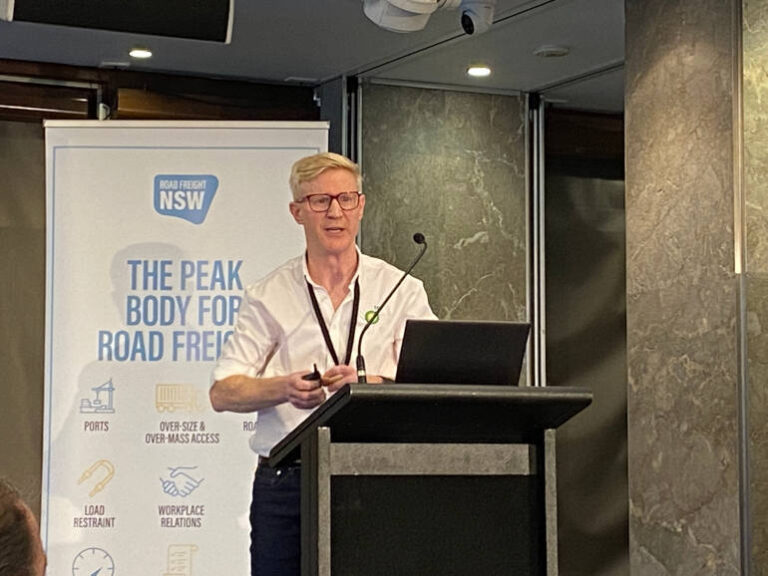At the 2024 Road Freight NSW Conference and Awards, Chris Leat, Business Development and Integration Advisor at bp, presented on the evolving landscape of alternative fuels for truck fleets. With a focus on the practicalities and future potential of renewable diesel, hydrogen, and electric vehicle (EV) charging, Leat provided a comprehensive overview of how bp is positioning itself to support the decarbonisation of the transport sector in Australia.
Acknowledging the challenges and opportunities
Leat began by recognising the unique challenges faced by the logistics sector in Australia, particularly in regions like Sydney, known for its diverse terrain and significant logistic demands. The traditional reliance on diesel is being reassessed in light of the pressing need to reduce carbon emissions. bp, a long-standing player in the Australian energy market, is pivoting towards becoming an integrated energy company, committed to offering a mix of traditional and renewable energy solutions.
The role of renewable diesel
A significant portion of Leat’s presentation was dedicated to renewable diesel, also known as Hydrogenated Vegetable Oil (HVO). This fuel can be used in existing diesel engines without any modifications, making it an attractive option for fleet operators looking to reduce emissions without substantial investments in new technology. Renewable diesel can reduce CO2 emissions by up to 90% depending on the blend, and can be distributed through existing fuel infrastructure, which simplifies its adoption.
Australia is particularly well-placed for the production of renewable diesel, thanks to its agricultural sector and the availability of suitable feedstocks. bp adheres to strict European standards, ensuring that their renewable diesel comes from second-generation feedstocks, such as waste materials and by-products from agriculture, thereby avoiding the food vs. fuel conflict.
bp’s commitment to net zero
BP has committed to becoming net zero by 2050, not only in its operations but also in the carbon intensity of the products it sells. This commitment is underpinned by significant investments in low carbon solutions. Globally, bp is investing $8 billion in low carbon projects, matched by a similar investment in traditional energy businesses. This dual approach aims to provide a secure, affordable, and clean energy supply to customers during the energy transition.
Integrated energy solutions
Leat highlighted BP’s strategy as an integrated energy company, focusing on three main pillars:
- Resilient hydrocarbons: Continuing to provide traditional fuels for sectors that will rely on diesel for years to come.
- Bioenergy and EV charging: Developing renewable diesel and expanding the EV charging network in Australia.
- Hydrogen and renewable power: Investing in hydrogen production and renewable power to support long-term decarbonisation goals.
A notable example of bp’s integrated approach is the Kwinana refinery project in Western Australia. The refinery, originally opened in 1953 and closed in 2018, is now being repurposed to produce green hydrogen, which will power a biorefinery for sustainable aviation fuel and renewable diesel. This project, known as H2K, exemplifies bp’s commitment to leveraging existing assets for future energy solutions.
Renewable diesel in practice
bp has been producing renewable diesel in Europe since 2011, and it is now becoming available in Australia. The fuel has proven effective in reducing emissions in various applications, including trials with BHP in Western Australia, where 20% and 50% blends of renewable diesel were used successfully in mining operations. These trials demonstrated that renewable diesel could significantly cut emissions without compromising performance.
bp also utilises a mass balance approach, allowing customers to benefit from the emissions reductions of renewable diesel without necessarily burning the fuel themselves. This method is similar to purchasing green power from an energy retailer, where customers gain the environmental benefits even if the physical electrons they use are not from renewable sources.
The future of EV charging
While the focus of bp’s current EV charging infrastructure is on passenger vehicles, Leat acknowledged the growing interest in electrifying medium-sized rigid trucks. bp has launched several EV charging points in Australia and is developing an EV charging corridor for trucks in Europe, which could serve as a blueprint for similar projects in Australia.
Hydrogen as a long-term solution
Leat expressed strong support for hydrogen, particularly for heavy, long-distance trucking. Hydrogen is seen as a viable solution for sectors where battery electric vehicles may not be practical. bp is involved in several hydrogen projects in Western Australia, aimed at both domestic use and export. However, the widespread adoption of hydrogen for trucking is anticipated to take place in the 2030s, as technology, infrastructure, and pricing mature.
Chris Leat’s presentation at the 2024 Road Freight NSW Conference underscored bp’s proactive stance in supporting the decarbonisation of the transport sector. By investing in renewable diesel, expanding EV charging infrastructure, and preparing for a hydrogen-powered future, bp aims to provide comprehensive energy solutions that align with Australia’s ambitious emissions reduction targets.
The transition to alternative fuels is complex and multifaceted, but with companies like bp leading the way, the path to a cleaner, more sustainable transport sector is becoming increasingly clear. For fleet operators, understanding and embracing these changes will be crucial in navigating the energy transition and meeting the demands of a low-carbon future.






